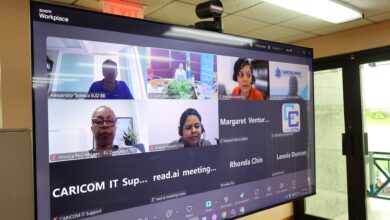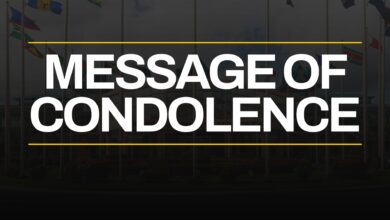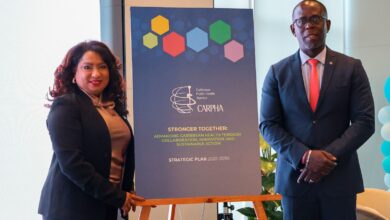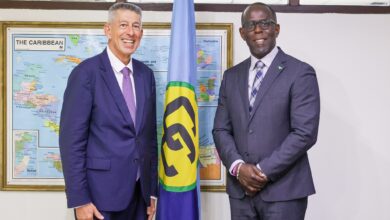I join the previous speakers in conveying my appreciation to the Commonwealth Local Government Forum, (CLGF) particularly its Secretary-General Mr. Carl Wright, and to the Government of The Bahamas. I am particularly pleased to have been invited to participate in this important conference. Coming as I do, fresh (or should I say weary) from a Meeting of the Council of Ministers of Foreign Affairs of the Caribbean Community in Jamaica which ended last Saturday, with its focus on the Caribbean Community’s relations with the external world, I see this Conference as the ideal counterpoint, orienting and emphasising as it does the essential role of localgovernment in our societies.
This is the first occasion on which this Conference is being held in the Caribbean. In so doing, it, among other things, gives us yet another opportunity to show to the world what warm and gracious hosts we can be. Just a few weeks ago, the Caribbean was host of the Fifth Summit of the Americas held in Port of Spain, Trinidad and Tobago. That event – none the least because the new US President was in attendance – saw international attention focused on that country and on the Caribbean as a whole. There will be yet another opportunity in November when the Heads of Government of the 53 Member Commonwealth gather, again in Port of Spain, for their biennial meeting. As important as this Conference of Local Government Ministers is in its own right, it must therefore be viewed as a precursor to that Heads of Government Meeting in November.
Ladies and Gentlemen, your experience here in The Bahamas, I can assure you is quite an event in its own right and you will soon discover, if you have not already done so, that there is a very good reason for the saying that It’s Better in The Bahamas! Those of you, from outside of the Caribbean, who are coming here for the first time, are following in the footsteps of a certain European, who many years ago lost his way in trying to get to India. He stumbled on these beautiful islands and reportedly thought he had arrived in heaven. In many ways he probably did! Whether so or not, I am sure that I have the approval of all the delegates here when I extend deepest appreciation to the Government and People of The Bahamas, for the warm welcome and generous hospitality being extended to us all.
Mr Chairman, Ladies and Gentlemen, the theme of this Conference – “Improving Local Government: The Commonwealth Vision” – is an important one for the countries of the Caribbean Community. Even more so is the title of this Opening Statement – “Regional Integration and the Role for Local Government”.
First, a word about our Caribbean integration arrangement. Our integration arrangement in the Caribbean Community (CARICOM) is based on four pillars – economic integration, foreign policy co-ordination, functional co-operation and security co-operation. Soon to be 36 years old and comprising 15 Member States and five Associate Members, CARICOM is the longest surviving integration movement among developing countries. Like all others, it is presently struggling in the face of the current global financial and economic crisis as it strives to advance from a Community and Common Market to a Community including a Single Market and Economy, better known by its acronym CSME.
For our Caribbean countries, most of them small by any standards, regional integration is the glue that binds them together and in that process Local Government has special significance. Historically it is in that mode of governance that many of our legislators first wet their feet in the art of representative governance.
It is those councils which provided, and continue to provide, some of the basic services for the population, such as sanitation, local road and bridge building and other infrastructure works as well as issuing licences and collecting rates and taxes on their own behalf and on behalf of central government.
The function of Local Government is however, no longer seen as the exclusive preserve of such municipalities, boroughs and councils but now encompasses the role of numerous community-based organisations working in various specific fields. These different organisations working for the development of their communities, in particular to enhance the skills of the people who live in those communities, are critical elements of local government.
In recognition of this reality, CARICOM in 2002 organised a Conference, appropriately entitled Forward Together, which brought to the table, representatives from different segments of civil society from across the entire Region. A particular segment of the society formally engaged in that process is the Youth, for whom a Regional Youth Commission and a system of Youth “Ambassadors” are part of the Community’s arrangements.
A couple of days ago I had a wonderful experience interfacing with a vibrant local community in rural Guyana. My experience there demonstrated at first hand the capacity within some rural communities for local governance. That particular experience brought home to me forcibly the inherent advantage that government rooted in the community has in providing for the needs of their people. It also demonstrated that a community sense of responsibility and ownership go a long way to making for more effective governance.
CARICOM must grapple with this challenge as it seeks to ensure the involvement of the people of the Community in the regional integration process. In so doing it needs to provide for the gains that the Community has made are not only secured but also form the basis upon which the integration process can be advanced.
It is in that sense of responsibility and ownership that there is a commonality of interest between leaders at the level of local government and at the level of the Caribbean Community. Put another way, to advance the process of integration, CARICOM needs the kind of responsibility and ownership of the process that is the hall mark of local government.
To this end, much as there has been, I am certain, that there is a need for more interaction between CARICOM and local government bodies to allow local government actors greater access to information about and greater scope for participation in the integration process.
This is so on an even broader scale, as the local government authorities are closer to many of the society’s key needs such as poverty alleviation. This is one of the main objectives of CARICOM as it seeks to establish a viable, prosperous, secure and sustainable Community for All. So also it is, if our countries are to succeed in meeting many of the Millennium Development Goals.
The Community for All, which is envisaged in the Declaration of Needham’s Point issued in Barbados in July 2007 at the 28th Meeting of the Conference of Heads of Government, is intended not only to ensure that all our Member States and Associate Members actively participate but also share equitably in the benefits of regional integration. That Declaration also envisaged that Functional Co-operation was the means through which this process would best be realised. That Declaration recognises that if the integration which the Community so earnestly desires to achieve and sustain, it must involve the deepening of co-operation among the peoples of the Community, and in that process the role of local government becomes crucial. Successful Caribbean integration and local government participation are therefore inextricably linked.
A key feature of this linkage is the necessity and capacity of Local Government authorities to build relationships among the diverse organisations and sectors that comprise their communities. Equally important is their ability to undertake in collaboration with key partners, several focused initiatives.
One initiative in which the CARICOM Secretariat as the key administrative organ of the Caribbean Community, would need to have greater collaboration with local government entities is in the area of public education. This is particularly so with respect to advancing the CARICOM Single Market and Economy (CSME) so critical to the development of the Region.
Mr Chairman, as regards recent progress in development of our local government system, CARICOM has had and is appreciative of, the external assistance and collaboration it has received. For example in 2002 in collaboration with the United States Agency for International Development (USAID), a Conference on Local Government and Decentralisation was held in Guyana. In 2004, with the assistance of the Commonwealth, a symposium was held in Jamaica under the theme “Local Democracy and Good Governance in the Caribbean”. At that symposium the Caribbean Ministers with responsibility for Local Government took the decision to establish a Caribbean Forum of Ministers (CFM) to facilitate a more coordinated regional organisation. That Forum is now being assisted by an expert provided by the Commonwealth to review local democracy and decentralization in the Region as well as to develop a regional policy and cooperation framework.
In 2006, the Ministry of Local Government, Trinidad and Tobago with support from CLGF, along with other organizations, held a Conference under the theme “Deepening Local Governance and Participation in CARICOM States.” At that conference the Port of Spain Accord was issued. The Accord spoke clearly with regard to the need to build on previous policy recommendations, notably the 2004 Montego Bay Action Programme and the 2005 Aberdeen Agenda: Commonwealth Principles on Good Practice for Local Democracy and Good Governance. These included:
• Promoting Local Democracy and Good Governance;
• Effective Service Delivery for All; and
• Regional Policy and Cooperation Framework for Enhancing Local Democracy.
Mr Chairman, I am pleased to indicate that the Draft Outline of the Regional Policy and Cooperation Framework, produced with the help of the Commonwealth expert was ratified at the second Meeting of the CFLGM held in December 2008 after much regional consultation. The next step is to have the document presented to the respective Member States before transmission to CARICOM Heads of Government for adoption. Once adopted, the Outline of the Regional Policy and Cooperation Framework is expected to be used as a negotiating position with international aid agencies to support the work of local governance in the Region.
As Secretary-General of CARICOM, I take this opportunity to extend gratitude to the Ministry of Local Government of Jamaica, the CFLGM and the Commonwealth expert for the outstanding work that they have done and are continuing to do in this field.
Also I believe the regular representation of the CARICOM Secretariat at the various Commonwealth Local Government Meetings including my own interaction with the CFLGM Regional Local Government Adviser, Mr Winston Cramer whom I have had the pleasure of receiving at my office in Georgetown, Guyana, demonstrates our commitment to strengthening the relations between the two Secretariats as well as shows our commitment to the overall process of improving local government in the Region.
Accompanying its many advantages, local government does have many challenges. Participants here today would no doubt agree that the financial challenge is foremost. This particular obstacle may not be instantly remedied or improved especially in light of the current world economic and financial crisis – and yet more not less local government contribution is required to help combat this crisis.
In closing, it is my strong belief that many of the challenges of local government – including that posed by the current financial and economic crisis – often bring with them opportunities. Indeed when in response to such crises communities come together out of a shared goal and common purpose, this represents a rich social capital which is the bedrock of Local Government
Finally, this Conference will no doubt have far-reaching consequences for improving Local government in our Caribbean Community and I believe in all Commonwealth nations. I therefore look forward to the outcome of these deliberations and of the resulting contribution they will make to the Heads of Government Conference in November and ultimately to the enhancement of the quality of life of the peoples in all our communities.
I thank you.





